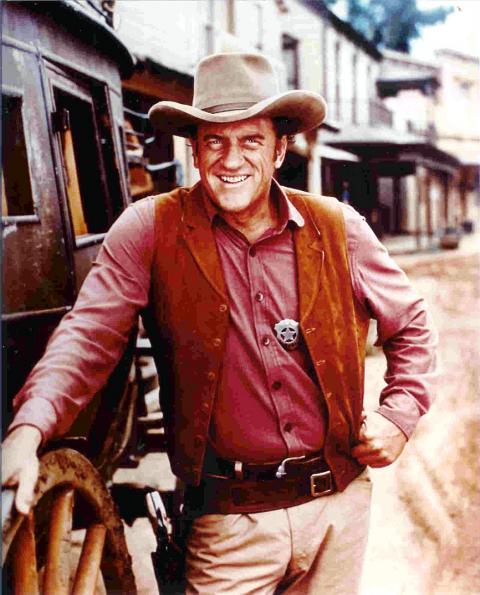James Arness, the towering actor who played rugged lawman Matt Dillon in long-running US television series Gunsmoke, died on Friday at the age of 88, his family said.
One of US television’s most enduring stars during the show’s 20-year run from 1955 to 1975, he returned in a number of Gunsmoke TV movies in the 1980s and early 1990s.
Like John Wayne on the silver screen, the 2m tall actor was an imposing presence on the small screen and was nominated for Emmy awards three times during the series’ early years. The show won praise for bringing psychologically complex characters into the TV format.

Photo: Reuters
“Matt is very human and has all the failings and drives common to anyone who is trying to do a difficult job the best he knows how,” Arness said.
Born in Minnesota, Arness was chosen when producers were looking for an actor to play Dodge City Marshal Dillon on television, after Gunsmoke had been a hit radio show for years.
He was already a well-known film actor, including in the sci-fi classics The Thing From Another World in 1951 and Them! in 1954, and was initially reluctant to give up his fledgling movie career.
However, Wayne urged him to take the role and provided an on-camera introduction in which he praised the new TV Western series for being honest, adult and realistic.
“I knew there was only one man to play in it, James Arness,” Wayne told viewers. “He’s a young fella and may be new to some of you. But I’ve worked with him, and I predict he’ll be a big star.”
Arness died of natural causes in his home in Los Angeles, family spokesperson Ginny Fazer said.

Asian perspectives of the US have shifted from a country once perceived as a force of “moral legitimacy” to something akin to “a landlord seeking rent,” Singaporean Minister for Defence Ng Eng Hen (黃永宏) said on the sidelines of an international security meeting. Ng said in a round-table discussion at the Munich Security Conference in Germany that assumptions undertaken in the years after the end of World War II have fundamentally changed. One example is that from the time of former US president John F. Kennedy’s inaugural address more than 60 years ago, the image of the US was of a country

BLIND COST CUTTING: A DOGE push to lay off 2,000 energy department workers resulted in hundreds of staff at a nuclear security agency being fired — then ‘unfired’ US President Donald Trump’s administration has halted the firings of hundreds of federal employees who were tasked with working on the nation’s nuclear weapons programs, in an about-face that has left workers confused and experts cautioning that the Department of Government Efficiency’s (DOGE’s) blind cost cutting would put communities at risk. Three US officials who spoke to The Associated Press said up to 350 employees at the National Nuclear Security Administration (NNSA) were abruptly laid off late on Thursday, with some losing access to e-mail before they’d learned they were fired, only to try to enter their offices on Friday morning

STEADFAST DART: The six-week exercise, which involves about 10,000 troops from nine nations, focuses on rapid deployment scenarios and multidomain operations NATO is testing its ability to rapidly deploy across eastern Europe — without direct US assistance — as Washington shifts its approach toward European defense and the war in Ukraine. The six-week Steadfast Dart 2025 exercises across Bulgaria, Romania and Greece are taking place as Russia’s invasion of Ukraine approaches the three-year mark. They involve about 10,000 troops from nine nations and represent the largest NATO operation planned this year. The US absence from the exercises comes as European nations scramble to build greater military self-sufficiency over their concerns about the commitment of US President Donald Trump’s administration to common defense and

Cook Islands officials yesterday said they had discussed seabed minerals research with China as the small Pacific island mulls deep-sea mining of its waters. The self-governing country of 17,000 people — a former colony of close partner New Zealand — has licensed three companies to explore the seabed for nodules rich in metals such as nickel and cobalt, which are used in electric vehicle (EV) batteries. Despite issuing the five-year exploration licenses in 2022, the Cook Islands government said it would not decide whether to harvest the potato-sized nodules until it has assessed environmental and other impacts. Cook Islands Prime Minister Mark Brown